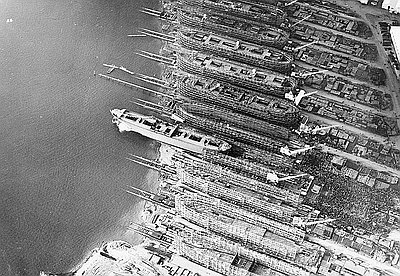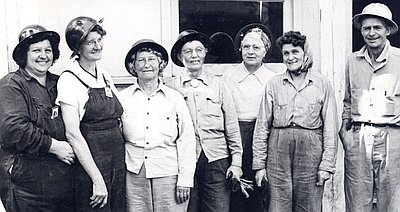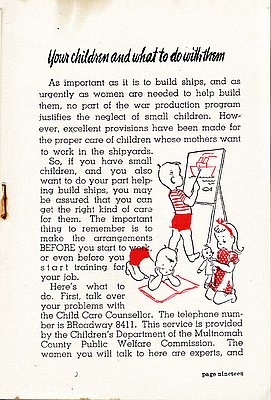- Catalog No. —
- 020096
- Date —
- July 7, 1943
- Era —
- 1921-1949 (Great Depression and World War II)
- Themes —
- Trade, Business, Industry, and the Economy, Women
- Credits —
- Oregon Journal
- Regions —
- Portland Metropolitan
- Author —
- John Mothershead
"No work, no woo" pledge, 1943
This Oregon Journal photo is captioned: "Albina Engine & Machine Works Employees Line up to Sign Pledge Not to Date Anyone w/out a Full Time Card." The women and men standing in line are identified as (left to right): Secretary Leona Dunphy, Teddy Wisted (in booth), Lee Jennings, Mildred Williams, Elizabeth Hahn, Pete Kraushaar, Louis Ross, Alice Kaufmann, Vernell Williamson, Dorothy Kinder, Ruth Cox, Stan Brown, Ruby Lepper, and Vivian Wallace.
In 1943, the Albina Engine & Machine Works, based in Portland, Oregon, came up with a plan to discourage absenteeism during World War II. The company asked employees to sign perfect attendance pledges, but with a twist: employees also promised not to date anyone who failed to turn in full timecards. The pledge was referred to as the "No Work--No Woo" pledge, and both men and women signed them. President Roosevelt, through Secretary of Labor Frances Perkins, notified Albina Engine & Machine Works in March 1943 that the pledge would become a national movement. Chapters were formed at shipyards and at Camp Adair, Fort Lewis, Fort George Wright, and many other American army posts.
Written by Mary Bryan Curd, 2015
Related Historical Records
-
Kaiser & Oregon Shipyards
In 1940, Henry J. Kaiser signed an agreement with the British government to build 31 cargo ships to aid that country in their war effort. After scouting several …

-
"Grandma Crew" at Oregon Shipbuilding Co.
This photo was published in the Portland Journal in 1944 with the caption: "'Grandma Crew' at Oregon Shipbuilding has 6 grannies out of crew of 8 production workers." …

-
Handbook for New Women Shipyard Workers
In 1943 Portland Public Schools produced a handbook designed to orient new women workes to life in the shipyards. One section dealt with the problems of childcare. During World War …

